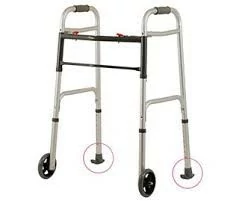
I can’t tell you the number of times I’ve seen or heard of a senior losing control of their rollator (Figure 1) and suffering injuries like broken knee caps, hips, arms and elbows, as a result.
The bottom line is that rollators are not for everyone – especially those with balance issues!
If you have issues with balance, weakness while standing, or need a firm immobile support to help you walk, you should not use a rollator and you should use a walker instead, see Figure 2.
A rollator is a great choice if you can balance yourself but need a place to sit frequently or you need help carrying oxygen tanks, or other necessities. A rollator is also helpful if you have weakness in your arms and you have a hard time lifting up a regular walker.
